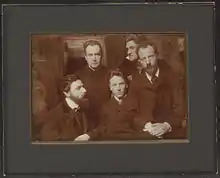Karl Wolfskehl
Karl Wolfskehl (17 September 1869 – 30 June 1948) was a German Jewish author and translator. He wrote poetry, prose and drama in German, and translated from French, English, Italian, Hebrew, Latin and Old/Middle High German into German.

Karl Wolfskehl was born in Darmstadt, Germany, the son of the banker and politician Otto Wolfskehl (1841–1907). He studied Germanic philology and a range of humanities courses in Giessen, Leipzig and Berlin. Under Otto Behaghel, he gained a PhD with a dissertation on a topic in German mythology. In 1898 he married Hanna de Haan, daughter of the Dutch conductor Willem de Haan at the court theatre in Darmstadt. They had two daughters, Judith (born 1899) and Renate (born 1901).
He defined himself by pride in his Jewish heritage as well as in his German cultural roots. He developed a lasting friendship with the poet Stefan George and was a leading figure in the poet's circle of friends and followers. With the philosopher Ludwig Klages and the archaeologist Alfred Schuler Wolfskehl formed the short-lived so-called Munich Cosmic Circle around 1900. His father's wealth allowed Wolfskehl to pursue an independent career devoted to his literary, intellectual and art related interests. Holding a jour fixe at his house in Schwabing Wolfskehl became a central personality in the literary life of Munich in the first two decades of the 20th century. Amongst his friends and associates were Rainer Maria Rilke, Thomas Mann, Wassily Kandinsky, Franz Marc, Paul Klee, Alfred Kubin and Martin Buber. In 1915, he bought an estate in Kiechlinsbergen at the Kaiserstuhl to which the family moved in 1919 after Wolfskehl had lost most of his fortune due to the war and the ensuing inflation. He was forced to earn a living as a tutor in Italy and as editor, cultural journalist and translator in Munich.
In 1933 appalled by Hitler's rise to power, Wolfskehl left Germany for Switzerland the day after the Reichstag fire, moving on to Italy in 1934. In 1938, due to the rapprochement between Nazi Germany and Fascist Italy, he moved to New Zealand with his partner Margot Ruben (1908–1980). He lived in New Zealand, where he was granted citizenship after World War II, until his death in 1948. There he became a staunch friend of the conductor Georg Tintner, also a refugee from Austria.[1]
Works (selection)
- Ulais. 1897.
- Gesammelte Dichtungen. 1903.
- Maskenzug. 1904.
- Saul. 1905.
- (with Friedrich von der Leyen) Älteste Deutsche Dichtungen. 1908 (translations).
- Sanctus. 1909.
- Gedichte des Archipoeta an Kaiser Friedrich Barbarossa und seinen Kanzler: nach Jakob Grimms Ausgabe. 1921 (translation).
- de Coster, Charles: Die Geschichte von Ulenspiegel und Lamme Goedzak und ihren heldenmäßigen, fröhlichen und glorreichen Abenteueren im Lande Flandern und anderwärts. München 1926 (translation).
- (with Curt Sigmar Gutkind) Das Buch vom Wein. 1927 (translations).
- Der Umkreis. 1927.
- Bild und Gesetz. Gesammelte Abhandlungen 1930.
- Die Stimme spricht. 1934/1936.
- An die Deutschen. 1947.
posthumously published:
- Hiob oder Die vier Spiegel. 1950.
- Sang aus dem Exil. 1950.
- Gesammelte Werke. 2 Vol. 1960.
- Briefwechsel aus Neuseeland 1938-1948. 2 Vol. Ed. C. Blasberg 1988.
- Briefwechsel aus Italien 1933–1938. Ed. C. Blasberg 1993.
- Von Menschen und Mächten. Stefan George, Karl und Hanna Wolfskehl. Der Briefwechsel 1892-1933. Ed. B. Wägenbaur and U. Oelmann, 2015
- Three Worlds / Drei Welten. Selected Poems. German and English. Transl. and ed. by A. P. Wood and F. Voit. 2016
- Poetry and Exile. Letters from New Zealand 1938-1948. Ed. and transl. By N. Wattie. 2017
References
- Tanya Buchdahl Tintner, Out of Time: The Vexed Life of Georg Tintner, p. 63
Sources
- Norman Franke, ‘Jüdisch, römisch, deutsch zugleich…’? Eine Untersuchung der literarischen Selbstkonstruktion Karl Wolfskehls unter besonderer Berücksichtigung seiner Exillyrik. Universitätsverlag Winter, Heidelberg 2006, ISBN 3-8253-5106-8 (German)
- Norman Franke, ’"Mirobuk!"Karl Wolfskehl als satirische Romangestalt'. In: Studia Niemcoznawcze, Studien zur Deutschkunde. (Vol. XXXI.,Warsaw, 2005), pp. 339 - 360 (German)
- Norman Franke, 'The last European and the first New Zealander'. In: SPAN, Brisbane, Hamilton 1998/99, pp. 57 – 71
- Manfred Schlösser, Karl Wolfskehl 1869-1948. Leben und Werk in Dokumenten, Darmstadt: Agora Verlag, 1969 (German)
- Manfred Schlösser, Karl Wolfskehl – Bibliographie, Darmstadt: Erato-Presso (AGORA Verlag), 1971, ISBN 978-3-87008-021-1 (German)
- Elke-Vera Kotowski, Gert Mattenklott: "O dürft ich Stimme sein, das Volk zu rütteln!" Leben und Werk von Karl Wolfskehl Olms, Hildesheim 2007, ISBN 978-3-487-13303-4 (German)
- Friedrich Voit: Karl Wolfskehl. A Poet in Exile. Cold Hub Press, Lyttelton / Christchurch 2019, ISBN 978-0-473-47669-4
-